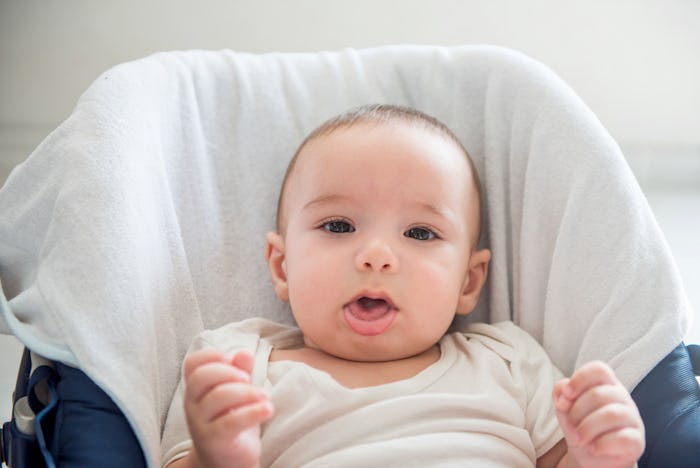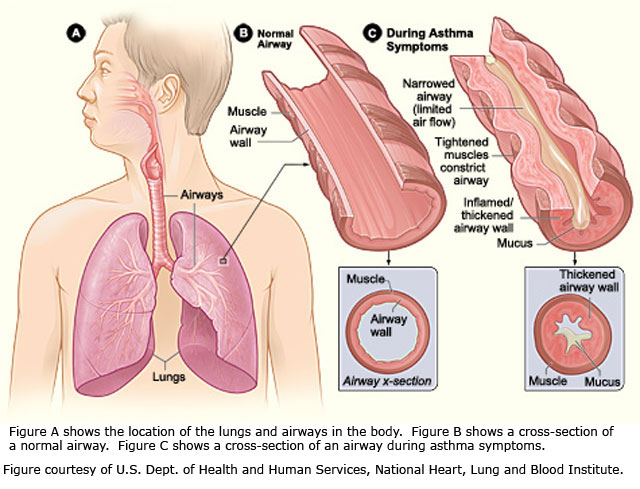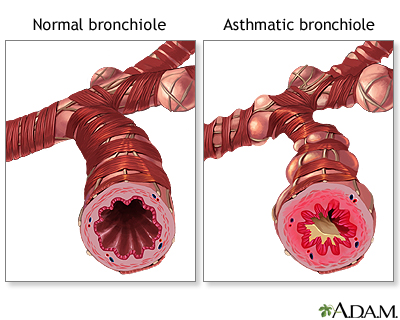Life

Here's What You Need To Know About Asthma In Babies, According To Experts
Asthma is a fact of life for millions of people the world over, and parents are rightfully concerned about the risk of their child developing the respiratory illness, especially if they have a family history of the disease. From birth, parents are told that babies are especially susceptible to any number of illnesses due to their immature little bodies. But can babies have asthma, or is that something that comes later?
I reached out to Laren Tan, MD, pulmonologist and director of Loma Linda University Comprehensive Program for Obstructive Airway Diseases, and he tells Romper, "Babies can have or develop asthma in infancy, but since baby and infant lungs are still developing, their airways tend to be smaller, and symptoms can vary from the typical asthma symptoms we commonly see in adults."
I remember when I was first evaluated for asthma, and much of the evaluation focused on the observation of my breathing, my ability to push air out of my lungs with significant force, and also a litany of questions surrounding how I felt at different times of the day or week. When my daughter was evaluated as a toddler, I remember the pulmonologist explaining how difficult it was to diagnose especially small children, because the criteria is so hard to meet.

Dr. Tan says that "babies with parents who have asthma are more likely to have asthma." Also that "mothers who smoke while pregnant also increase their baby’s risk of having asthma, and smoking around babies who already have asthma can result in worsening of their symptoms." As if we all needed one more reason to cut the nicotine addiction.
The ultimate reasons why babies and children develop asthma aren't yet certain in the eyes of science. "Although not well understood, early viral respiratory infections have been proposed to cause asthma and are considered one of the main reasons for worsening asthma control — especially after an infection," Tan notes. Allergies, environment, and predisposition also play significant roles.
The fact that we don't have a good grasp on the mechanics and the impetus of asthma in babies leads some doctors, like Dr. Rob Darzynkiewicz, (known as "Dr. Rob") Chief Medical Officer of Hazel Health, to hold off on diagnosing babies with the chronic illness. He tells Romper that "babies can have symptoms exactly like asthma, but they are too young to be formally diagnosed. Just because your baby wheezes doesn't mean he or she has asthma. Viruses and colds can cause babies to have those symptoms." This is known as "Reactive Airway Disease."

If you're concerned about your child's breathing, it's best to call your pediatrician right away. Any concern about your child's lungs or airway need to be evaluated immediately. Dr. Rob says that parents should note how quickly your child is breathing, if your child is wheezing, "or if you see them using extra muscles to breathe." He continues that "normal breathing rates for children under 1 year of age is 30-50 breaths per minute, 1-2 years is 22-40 breaths per minute."
Dr. Rob also went on to instruct parents to observe their children, and that "if you see their neck muscles moving or you can see indents between their ribs between breaths (at rest) they are using 'accessory muscles' and need to be evaluated right away." Likely, this will garner a trip to the emergency room. "If they are making unusual sounds (grunting, wheezing), that is not typically normal."
Can babies get asthma? They can certainly begin to develop the types of breathing complications that would eventually be diagnosed as asthma, so trust your gut. If you think your child is struggling, get them to the doctor or emergency room to be seen right away.
This article was originally published on